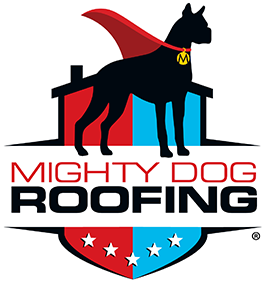Types of Roof Storm Damage: What Homeowners Should Know
Navigating the Stormy Spectrum of Roof Damage
Protect your home against the most common types of storm damage. A home’s roof represents its first line of defense against the elements. When a storm hits, wind-driven rain, hail, and snow can wreak havoc on a roof, causing damaged shingles, loose flashing, and other visible damage. While we are on the subject, let’s take a closer look at the top seven types of roof damage.
1. Water Damage
A local roofing contractor builds a roof by installing waterproofing on the roof decking before nailing on the asphalt shingles. However, wear-and-tear reduces the water-resistant qualities of a roof, making it susceptible to roof storm damage. Any leakages or moisture retention during the next storm may result in mold and mildew growth.
Heavy rains tend to wash away loose granules that lie on the surface of roof shingles. These granules help keep the house cool by reflecting the sun’s rays away from the roof. The granules then get washed away during storms, reducing the effectiveness of the shingles and making it difficult to keep the gutters clean.
2. Wind Damage
During a storm, strong winds can pull apart loose roof shingles. High winds can also break overhanging tree limbs, causing them and other debris to fall onto the rooftop. This type of roof storm damage can compromise the structure of the house and destroy roofing materials. After some particularly nasty weather, a storm damage repair company should come out to inspect the roof.
As part of the roof inspection, the local roofing contractor will repair or replace weak, loose shingles to prevent them from flying away in future severe weather conditions. Roofing specialists will also cut tree limbs that grow over the house to avoid further damage from subsequent storms.
3. Snow Damage
Snow may generate a festive mood, but it can also cause storm damage, especially for houses with weakened roofs. As layers of snow settle on the roof, the weight can take a toll. As the snow melts, moisture buildup can penetrate through leaks in the roof.
Melting snow flowing through the gutters can freeze when the temperature changes. Ice trapped in the gutter can cause the gutters to overflow or break. Regular inspections of the roof drainage system and removing snow from the roof will prevent this type of storm damage.
4. Ice Damage
Pre-existing problems like leaks and gaps can magnify ice damage during the winter. Ice can form along irregular roofing material, allowing meltwater to seep into a home’s interior and causing storm damage. When ice forms under the flashing, the roof damage can undermine part of the roof structure.
Houses with improper insulation can also form heavy ice dams on the roof as heat escapes from the attic. If ice dams remain on rooftops for a long time, it leads to water retention under the surface. The weight of ice dams can also cause severe storm damage by collapsing a weakened roof deck or rafter.
5. Hail Damage
The destruction left behind by hail storms can shorten your roof’s lifespan and hamper its performance. A shower of hailstones can crack asphalt shingles, knock off granules, and puncture metal roofs. Small pieces of hail can still damage roofs, making them more susceptible to sun exposure.
While most people worry about large hailstones, small hail causes the same amount of damage to roofs over a long enough period of time. Hire a roofing contractor to check for signs of hail damage on roof decking, flashing, and gutters.
6. Sun Damage
For most homeowners, sun damage remains an afterthought when it comes to roof protection. However, prolonged exposure to the sun can make the roofing materials brittle. Then, the compromised roof cannot withstand harsh weather, such as snow, rain, or hailstorms.
Signs of sun damage include curling shingles and changes in the roof’s color due to bleaching. Sturdier materials, like clay tiles or slate, hold up better under the sun’s powerful rays and strong winds but sometimes break in hail storms.
7. Impact Damage
When a heavy or fast-moving object hits the roof, the impact can destroy roofing materials or even penetrate the roof decking. Amateur tree trimming and mischievous children are the most common forms of roof damage caused by physical impact. While technically not storm damage, it can pave the way to water leaks when the first storm rolls in.
Repair Roof Damage With Mighty Dog Roofing
Repair or replace your roof with ease by hiring a roofing company that will help you deal with your insurance company. Our veteran roofers will help you build a claim covered by your homeowner’s insurance policy. Call Mighty Dog Roofing at (833) MIGHTY 4 to schedule a consultation with a free estimate.


